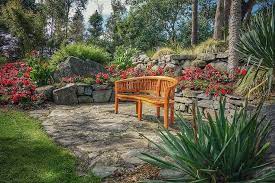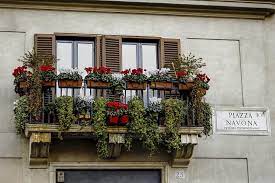By Devraj Singh Kalsi


A balcony teeming with plants showcases the best efforts put in by flat owners to keep alive their connection with nature. Unlike those living in sprawling houses with plenty of open space to make a garden, flat residents have to live with a space crunch that makes them think of buying space-saving furniture all the time. It does not really matter whether the densely potted varieties in the balcony supply oxygen for an hour or not. The plants merely convey that the inmates carry a genuine love for nature, but the constraints of space in the cities prevent them from creating a full-fledged garden.
The other vital truth is that the miniature garden helps them assuage the guilt of causing environmental damage before the World Environment Day posters deliver ‘Save the Planet’ message every year. The air conditioner jutting out of the window next to the balcony garden proves they are equally culpable for impacting the planet’s health. But every inch of the balcony dotted with plants is the best frame that provides the opportunity to post candid pictures on social media and gather hundreds of likes for having green fingers despite the CFC generated by most air conditioners.
In my ancestral home, I used to observe my father turn the soil every morning. As he worked with his garden tools, I took an interest in his hobby, thinking I would inherit his passion for the same. He created small beds, raised mounds of soil around tender plants to offer better support and strength, and watered them with a sprinkler with patience, making sure they were not too wet.
With the onset of winter, the saplings would be ready to deliver iridescent blooms and surprise us with their vibrant beauty. Pansies, dahlias, zinnias, carnations, roses, and petunias were some of the awesome floral feasts that occupied much of our garden beds though there were many others that were less popular and with scientific names that have elude my meory. As the first buds appeared, my parents would admire the lush garden and ask me to sit in front of those budding flowers with well-combed hair to strike a pose while my father clicked a series of random photographs.
While I never found ample time to take up gardening, I made it a habit to water the plants in the evenings on alternate days after my tutorials. Slaking the thirst of others – whether humans, animals, birds or plants, gives the same kind of satisfaction. I was careful not to keep them thirsty for long and maintained a strict timeline for that – otherwise I would feel guilty and sleepless at night. If I would be absent for a few days, I would assign the duty to some other person. Along with plants, I was learning to be sensitive to others needs.
The blooming flowers generated the desire to possess beauty. I was told I should not pluck them but learn to admire them. It was another key lesson – to indulge in the appreciation of beauty instead of being ruthless about possessing the beautiful. Any piece of beauty, in any form, gets the same treatment. Admire instead of turning desperate to possess it or call it your own. Such treasure-worthy lessons last a lifetime. It is true nature teaches a lot many things to lead a good life. A garden full of colours of all varieties looked rich and tempting. My mother never plucked any of the flowers, never put them in a vase in the living room to make a statement. Such restraint amazed me.
I was encouraged to plant some on my own – before the advent of the floral season. My initial reluctance petered out when I read many celebrities were pursuing it. The ones I planted were lucky if they survived. I felt sad and low when they did not survive. But when some of them bloomed well, negativity perished.
The first bloom made me glad and confident, encouraging me to look forward to planting more varieties the next year. The ones that perished were soon forgotten and my focus shifted to the survivors, wondering whether they found it easy to grow in their beds or if there was something I could have done better to ease their growth in the lush garden.
My parents gave a nod of approval and okayed my efforts. It was deemed a good exercise to raise a garden, add manure or spray something and water them all.
After my father’s death, my mother brought saplings from the nearby nursery, expecting me to do what my father did. She would sit near the verandah and oversee the entire process. Her supervision continued and she derived satisfaction that she had managed to raise a child who was growing close to nature with each passing year. She was always the first person to spot the buds and had the habit of predicting the colours of the flowers before they bloomed. She conducted a tour of the garden every morning and would foretell which one would turn out to be yellow, red, or white. Most of the time, her guesses were right. It appeared I was under an expert. When the flowers bloomed, she would say such impeccable beauty is for the soul, as it makes you happy deep within.
Blooming is so relevant a need for every creative person: to bloom with ideas that are fresh, appealing to the senses and fragrant. Tucking a flower in the vase in front of the writing desk is a serious effort to bring in visual freshness, and to feel positive. With creepers growing around, you feel the spread of ideas surround you, trying to reach higher and higher just like you keep trying to elevate your thoughts and consciousness. Even if the apartment does not offer a grand view of thirty feet-high Ashoka trees lined up outside my window, the mind’s eye still retains and cherishes its beauty while trying to find inspiration from the balcony garden, a poor substitute for the grandeur of the landed garden.
While living in an apartment does not offer a natural view, the truth is I am still writing and have yet to break up with nature. Whether memory continues to feed the imagination or the fear of writing without nature’s support leads to a premature loss of an intimate connection with nature will pan out in the coming years. Sometimes the loss agonises so much that one feels like writing tragedies especially if it is the death of loved ones. It remains to be seen what the permanent loss of a vast garden from my life brings forth.
.
Devraj Singh Kalsi works as a senior copywriter in Kolkata. His short stories and essays have been published in Deccan Herald, Tehelka, Kitaab, Earthen Lamp Journal, Assam Tribune, and The Statesman. Pal Motors is his first novel.
PLEASE NOTE: ARTICLES CAN ONLY BE REPRODUCED IN OTHER SITES WITH DUE ACKNOWLEDGEMENT TO BORDERLESS JOURNAL
Click here to access the Borderless anthology, Monalisa No Longer Smiles
Click here to access Monalisa No Longer Smiles on Kindle Amazon International